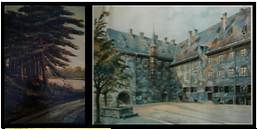Der Führer: Young Adulthood and Influence
Two years later after he drop from schooling, the 18 year old Adolf had finally left Linz, and with the finance of orphan’s benefits and support from his mother, to study the fine arts at Vienna. However, he was rejected twice from his admission to the Academy of Fine Arts Vienna. He was suggested by one of the directors at the school to join the School of Architecture, but since he did not finish secondary school, he lacked the credentials to apply. Back at home, Klara, his mother, had been suffering chest pains that woke her at night. She consulted Eduard Bloch, a Jewish family doctor, where Bloch had discovered she had breast cancer in January, 1907.
To be noted, Klara had noticed a lump in her breast a year earlier, but thought of it as nothing. Bloch had contacted Adolf to inform his mother of her condition. Adolf was told by Bloch that she had a small chance of surviving, and it was recommended for her to undergo a mastectomy. Adolf was tremendously devastated by the news, but he tried continuing his studies. According to Bloch’s observations, he stated that Klara Hitler "accepted the verdict as I was sure she would – with fortitude. Deeply religious, she assumed that her fate was God's will. It would never occur to her to complain.” After surgery at Sisters of St. Mercy in Linz, she was informed by her surgeon, Karl Urban, that the cancer had already metastasized in the pleural tissue of her breast. Her children were informed that her condition was terminal. Adolf and his other siblings moved back home to tend for their mother. In the same year in October, Klara’s health rapidly declined. Adolf begged for Bloch to try a new treatment to save her life. Despite 47 days of the treatment of iodoform, an experimental form of chemotherapy, it failed, and she died on December 21, 1907 at the age of 47.
Adolf would carry the grief of his mother’s death for the rest of his life with him stating in his book, Mein Kampf, "...honored my father, but loved my mother". Bloch had also recalled that "In all my career, I have never seen anyone so prostrate with grief as Adolf Hitler." Also, in 1940, 33 years later, Bloch, who is Jewish mind you, was pardoned by Adolf since he tended for his mother and allowed him to emigrate, with his wife, to the United States. After his mother’s death, Adolf had found it difficult to keep a job and earn money. By 1909, he had run out of money. He lived life in and out of homeless shelters and a men’s dormitory on Meldemannstraße 27 in Vienna’s Brigittenau district. During this part in his life, he worked as a casual laborer and painted watercolors of Vienna’s sights to earn money. Though this contradicted with Reinhold Hanisch, Adolf’s business partner, statements about him. He stated, "He (Hitler) was never an ardent worker, was unable to get up in the morning, had difficulty in getting started, and seemed to be suffering from a paralysis of the will." Also, he said, "I've never seen him do hard work, yet I heard that he had labored as a construction worker. Contractors employ only strong and powerful people."
But during his time in Vienna, it was where Adolf pursued a growing passion for mainly two interests: architecture and music. He had attended the performance of Lohengrin, his favorite opera of Wilhelm Richard Wagner a total of 10 times. However, he was also exposed to anti-Semitism and racist rhetoric, becoming the racist he is known as. Populists like Karl Lueger had exploited anti-Semitism and exposed to German nationalist nations for political gain and influence. German nationalism affected the Mariahilf district in Vienna where Adolf had lived. Other people that influenced him are: George Ritter von Schönerer (politician and landowner), Martin Luther (15th century professor of theology and a monk), Houston Stewart Chamberlain, Charles Darwin, Friedrich Nietzsche, Gustave Le Bon, and Arthur Schopenhauer. Adolf also read local newspapers that promoted anti-Semitism like the Deutsches Volksblatt, which encouraged prejudice and played on Christian fears of Eastern European Jews. The true origins are unknown, though.
August Kubizek, a friend of Adolf, had claimed him to be a “confirmed anti-Semite” when he left Linz. This reason is but contradicted by Adolf’s own claim in his book, pointed out by historian Brigitte Hamann, says as it stated that he became an anti-Semite while his time in Vienna. It did not agree with Reinhold. He claimed Adolf was good friends with Jews in the men’s dormitory in Vienna. This is conflicted once again with claims by historian Richard J. Evans with him saying that "historians now generally agree that his notorious, murderous anti-Semitism emerged well after Germany's defeat [in World War I], as a product of the paranoid "stab-in-the-back" explanation for the catastrophe". Overall, it is still highly disputed as it is very unclear of began his racist ways of being an anti-Semite.

